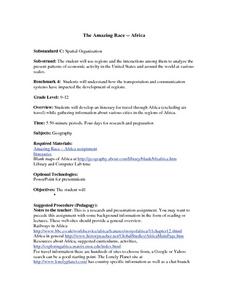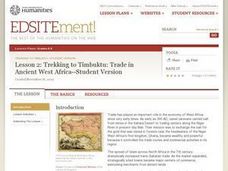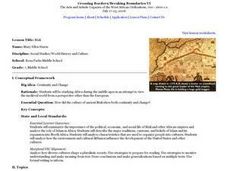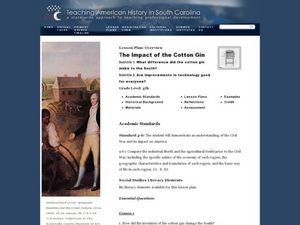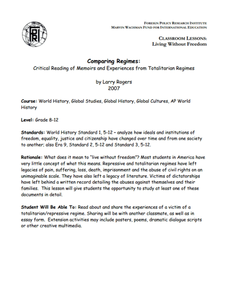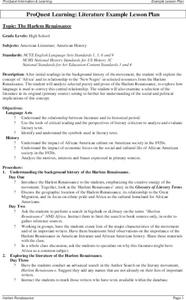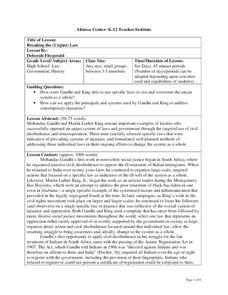National Endowment for the Humanities
David Walker vs. John Day: Two Nineteenth-Century Free Black Men
What was the most beneficial policy for nineteenth-century African Americans: to stay in the United States and work for freedom, or to immigrate to a new place and build a society elsewhere? Your young historians will construct an...
National Endowment for the Humanities
How to Win a World War
High schoolers are have begun to learn the art of diplomacy with each other, but do they understand how diplomacy works at a global level? The second in a series of four lessons, guides scholars in evaluating primary sources. The why...
PBS
African American History: Climbing the Wall
Imagine the challenge of trying to trace your family genealogy if no records were kept of births and deaths. Where would you look for information? What types of documents could provide you with the information you seek? History...
Curated OER
Analyzing Sources on Imperialism
Ninth graders explore the concept of imperialism. In this imperialism lesson plan, 9th graders analyze primary sources regarding British imperialism in Africa. Students analyze the sources for credibility as they gain an understanding of...
Curated OER
A Durable Memento: Portraits by Augustus Washington
Students read primary source newspaper articles from mid 19th century United States. The topics of the articles are slavery, abolitionism and colonization. Students are given several options for activities based on the readings.
Curated OER
Africa Colors a Destiny
Students discover the peace corps and the culture of Chad. In this cultural awareness lesson, students watch a slide show and examine various primary sources from peace corps volunteers in Africa. This lesson includes web-links,...
Curated OER
The Amazing Race -- Africa
High schoolers conduct research and gather information regarding various cities in Africa. They discover what it would take to travel to and through Africa and plan a trip through various regions of the continent. They present their...
Alabama Department of Archives and History
An African American Represents Alabama during Reconstruction
The era after the Civil War saw a flourishing of African Americans exercising their rights. Using graphic organizers and Internet research, pupils consider the legacy of Benjamin Sterling Turner, who sat in Congress. Afterward, they...
National Endowment for the Humanities
Writing a Diplomatic Toast
Here's to you! Using a role-playing activity and primary source analysis, learners discover the importance of diplomacy. Impersonating a diplomat from a great empire, they write a toast to another empire, analyzing the strengths and...
Curated OER
Trekking to Timbuktu: Trade in West Africa (Lesson 2)
Students examine the importance of trade in West Africa. Using a virtual time capsule, they travel back to ancient times and travel along with a caravan. They answer specific questions related to the journey and items they are trading....
National Endowment for the Humanities
Analyzing “Intercepted Intelligence”
A good diplomat needs to know how world events can affect their country. First, class members examine the Papal Bull that excommunicated Queen Elizabeth I from the Roman Catholic Church. Then, learners playing the role of diplomat from...
Curated OER
Mali
Seventh graders begin the lesson plan by reading primary sources about the country of Mali. Using maps drawn in the past, they discuss what they can gather about the country from the map and how it has changed over time. They use a...
Roy Rosenzweig Center for History and New Media
Slaves and Indentured Servants
In theory, at least, indentured servitude and slavery were two different practices in the American colonies. Class groups conduct a close reading of two primary source documents, one written by a slave and one by an indentured servant,...
Roy Rosenzweig Center for History and New Media
European Explorers
To compare how the Spanish, French, and English approached the exploration of North America, class groups examine primary source documents and become experts on one of four explorers: Francisco Coronado, Robert LaSalle, Samuel de...
Curated OER
Drake’s West Indian Voyage 1588-1589
Students examine the exploration routes of Sir Francis Drake. In this American exploration lesson, students investigate primary sources to trace the routes and contact with the natives that Sir Francis Drake experienced on his voyages in...
Curated OER
Pluralism
Young scholars analyze advantages and disadvantages of living in a plurlistic society. They work in groups, to identify the various groups (blacks, whites, Asians, and Coloureds) in the era of apartheid in South Africa by using primary...
Curated OER
The Impact of the Cotton Gin
Fourth graders study Eli Whitney and the cotton gin. In this lesson on the cotton gin, 4th graders use primary and secondary sources to gather information about Eli Whitney, the cotton gin that he invented and how it changed the south.
Foreign Policy Research Institute
Comparing Regimes: Critical Reading of Memoirs and Experiences from Totalitarian Regimes
Can you imagine living in a totalitarian country? Learners will read several primary source memoirs to gain a deeper understanding of what life is like under a controlled government. They'll discuss each piece in pairs, research...
Curated OER
West Indies and The Caribbean: Sugar & Slavery
Young scholars study the state of the world before the slave trade. They explain the geography and economics of the slave trade. They explore primary sources and how historians use these sources to create historical interpretations.
Curated OER
The Harlem Renaissance
Learners, after researching/analyzing the movement "Harlem Renaissance" and Africa as well as reading literature from that time period, create lists of the major characteristics of the movement and its important writers. They bridge the...
Curated OER
Hunger in Africa
Students investigate the work of the Carter Center in addressing hunger in Africa. In this African health issue instructional activity, students respond to essential questions regarding the work the Carter Center does as they visit...
Learning to Give
Africa - The Great Southland
Applying the five themes of geography, preteen explorers develop a visual aid for younger learners in celebration African American History Month. They investigate the political, geographic, economic, and social aspects of the continent...
Curated OER
MEDIEVAL SUB-SAHARAN AFRICA
Seventh graders examine the area of medieval Sub-Saharan Africa through eyes of travelers in the company of one of history's greatest travelers, Ibn Battuta. The project has been structured to include all the State standards for this unit.
Curated OER
Breaking the Unjust Law
Students consider the concept of civil disobedience. In this lesson on changing unjust laws, students use primary sources to understand how Gandhi and King changed the law. Students will then list laws that they feel are unjust and plan...








